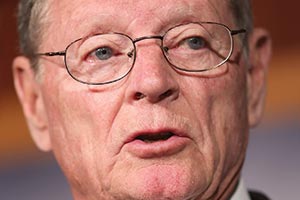Senate Sends Highway Fix to Obama for Approval

This story appears in the June 1 print edition of Transport Topics.
The Obama administration had expressed support for a measure the Senate passed May 23 that would extend funding authority for highway programs through July 31.
President Obama was expected to sign the measure into law before funding authority for the Highway Trust Fund expired May 31.
After the vote in the Senate, the leaders of the chamber’s transportation policy panel announced their intention to hold a markup hearing on a six-year highway reauthorizing bill June 24.
“It’s time we end this costly uncertainty with the Highway Trust Fund,” Sens. James Inhofe (R-Okla.) and Barbara Boxer (D-Calif.), chairman and ranking member, respectively, of the Environment and Public Works panel, said in a statement.
“The only solution to fixing this problem is to enact a consensus-based, bipartisan, six-year surface transportation bill that will provide states and local communities the funding and the certainty they need to plan and construct multiyear projects to modernize our infrastructure,” they added.
Support for a long-term highway bill appears to be mounting in the Republican-led Congress. Senate Commerce Committee Chairman John Thune (R-S.D.) told Transport Topics that he hopes the most recent funding patch is the last time lawmakers rely on such an extension.
In the House, Rep. John Delaney (D-Md.), author of legislation that would establish a $50 billion infrastructure fund, called on colleagues to approve a long-term fix. A few days before the Senate vote, Delaney announced that more than 400 Maryland residents contacted his office complaining about aging infrastructure in his state and around the country.
“We’re facing a national infrastructure crisis, and we can’t rebuild America as long as Congress is stuck in neutral,” Delaney said. “It’s time for both
parties to get in gear and work together on a long-term highway bill so that state and local governments can start building and make smart long-term plans.”
The short-term extension, which was reported out of the House by a vote of 387 to 35, with one member voting present, was met with disappointment by several groups, such as the American Association of State Highway and Transportation Officials and the Laborers’ International Union of North America.
“State DOTs are already postponing construction projects this year because they can’t count on federal funds to be there,” said Bud Wright, AASHTO’s executive director. “Millions of dollars that should be flowing into communities, creating jobs and paying for projects to improve safety and mobility aren’t being funded. Congress must find the political will to pass a long-term bill and put these short-term patches aside,” he added.
“Thousands of workers in the construction industry rely on federal transportation infrastructure investment to care for their families, and in the process, they build America,” said Terry O’Sullivan, LIUNA’s president.
According to the Congressional Budget Office’s recent baseline, the trust fund is spending slower than expected, and a two-month patch would eliminate the need for offsets before August. After August, Congress would need to transfer funds into the trust fund or implement a long-term funding fix to keep the account operable.
The CBO also has indicated that a six-year bill would need about $100 billion in new revenue. So far, congressional leaders are not in agreement about where to find those funds.
Since 2008, Congress has approved more than $65 billion in transfers to prevent the fund’s collapse.

